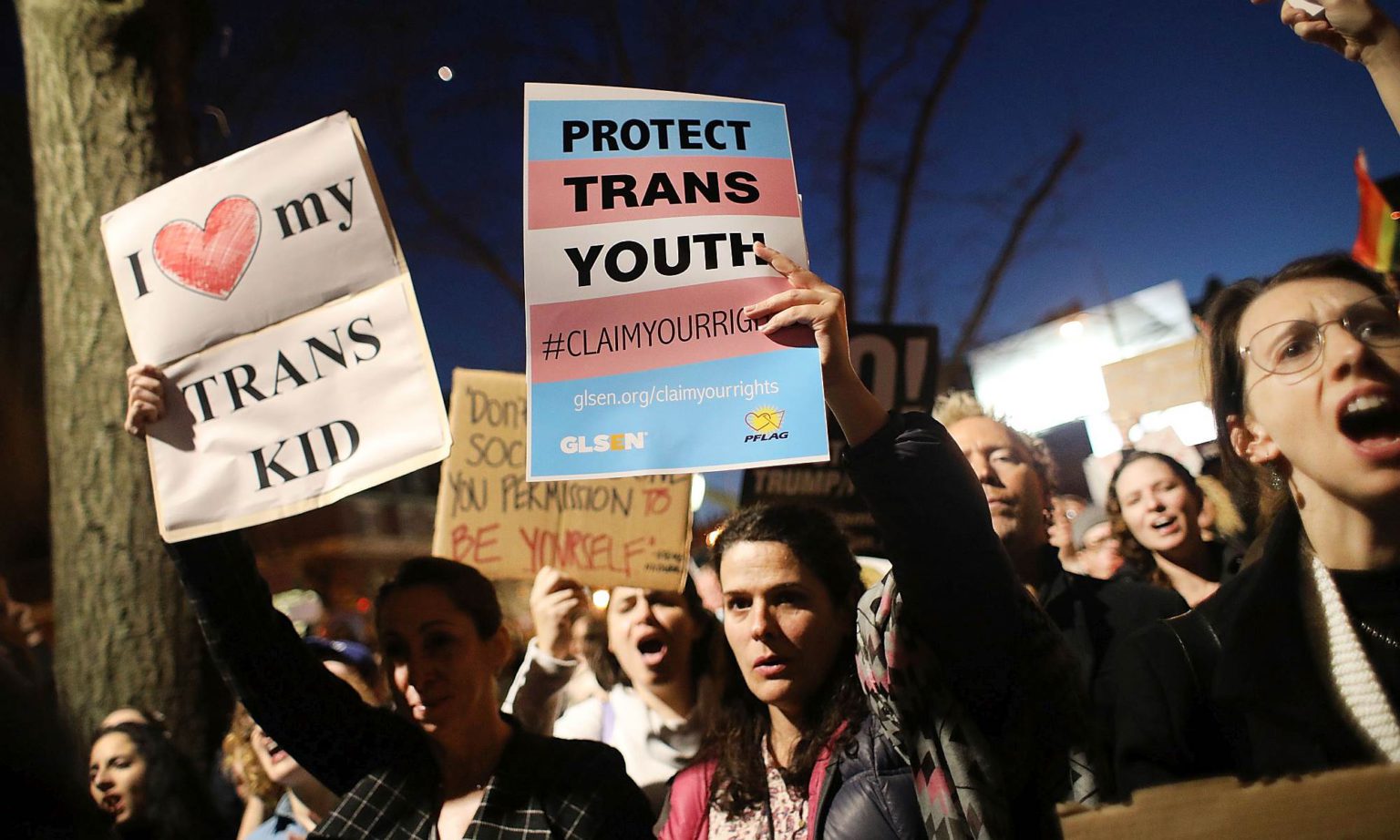
Long-read
Is the Tavistock gender clinic failing children?
The Gender Identity Development Service seems to have lost its way.
Want unlimited, ad-free access? Become a spiked supporter.
For 24 years, the Gender Identity Development Service (GIDS), headquartered at the Tavistock and Portman NHS Foundation Trust in North London, has been seeing, counselling and treating adolescents and children diagnosed with ‘gender dysphoria’. This, as the NHS describes it, is ‘the sense of unease that a person may have because of a mismatch between their biological sex and their gender’.
For much of GIDS’ existence, few paid it much attention. But over the past 10 years all that has changed. Not only have transgender issues become the object of fierce public controversy and mooted government legislation, but diagnoses of gender dysphoria among children and adolescents have skyrocketed. As The Sunday Times reported last year: ‘Since 2009-10… there has been an increase of more than 3,200 per cent in patients referred to GIDS, from 77 that year to 2,590 in the year to April.’ Moreover, 2019 was the first time the majority (54 per cent) of patients referred to the clinic were 14 or under – some patients were as young as four.
Unsurprisingly, GIDS’ activity at the Tavistock has been subject to increasing public attention, and, more recently, scrutiny. In 2018, an internal report, by then staff governor Dr David Bell, effectively accused GIDS of fast-tracking children and adolescents for gender transition. Featuring damning quotes from whistle-blowing clinicians and unhappy staff members, it reinforced the growing sense that GIDS has been a little too eager to encourage young people to transition and potentially undergo life-changing medical treatment. Indeed, since 2017, over 35 clinicians have quit GIDS because they are worried about ‘overdiagnoses’ of gender dysphoria. Sonia Appleby, who works at GIDS as its Named Professional for Safeguarding Children, is even bringing a case against the Tavistock on the grounds that it is failing in its duty to safeguard children, by encouraging staff not to report any child safety concerns to her.
In some ways, however, the controversy in which GIDS now seems mired is a mark of just how far it has come.
The growth of GIDS: from dysphoria to development
The Gender Identity Development Clinic, as it was first known, began life at St George’s Hospital in 1989. Its founder, the child and adolescent psychiatrist Domenico Di Ceglie, decided to establish the clinic after a series of in-hospital workshops with adolescents and young people presenting with issues around their gender. Seven years later, it moved to its current home at the Tavistock and Portman NHS Foundation Trust, before being nationally commissioned by NHS England in 2009.
Di Ceglie’s clinic was certainly innovative. Hitherto, gender dysphoria had been understood in terms of paraphilia, as an abnormal sexual desire. But at a 1996 conference (quickly turned into a collection of essays entitled A Stranger In My Own Body, (1996)), Di Ceglie proposed a different framework for understanding young people’s gender issues. Coining the phrase ‘atypical gender-identity organisation’, Di Ceglie argued that, while in some cases gender trouble in children can manifest itself as a disorder, it can also be ‘a process analogous to the development of a vocation, such as an early calling to the priesthood or an enduring and compulsive ambition to pursue particular professional roles’. In other words, the desire to change gender was no longer necessarily a psychological problem, let alone a product of abnormal sexual desire; it was a legitimate individual aspiration. Indeed, it was a journey, a process of development, to be facilitated, rather than a condition to be treated.
In his foreword to A Stranger In My Own Body, American psychologist John Money also frames gender dysphoria in terms of development. ‘Like all other aspects of development’, he writes, ‘gender identity can in a variety of ways become derailed. All too often the response of adults is to blame the victim and to punish or criminalise the derailment.’ The point, as Money, Di Ceglie and their contemporaries saw it, was to stop judging ‘the derailment’, and start understanding and even facilitating it as part of an individual’s development.
This was a significant move. In changing the language around gender-identity issues from disorder (something negative and difficult to bear) to development (a positive journey), the work of Di Ceglie and his colleagues started to change the way clinicians and doctors related to their gender-troubled patients. The growth of GIDS, first at St George’s and then at the Tavistock, consolidated and institutionalised this shift. And, in the process, it paved the way for more and more troubled children to begin to conceive of a solution to their problems in terms of gender identity.
Today, the Tavistock’s Gender Identity Development Service is the only nationally commissioned, NHS-funded specialist clinic of its kind. It is dedicated ‘to understand[ing] the nature of the obstacles in the development of gender identity, and to try to minimise their negative influence’.

GIDS has never been busier. The number of referrals to the Tavistock has risen from 1,408 in 2015-16 to 2,728 in 2019-20. What is also interesting is that while much of the broader discussion of transgenderism has focused on male-to-female transitioning, the numbers at GIDS reveal a different trend. In 2018-2019, the referrals of those assigned female at birth stood at 74 per cent, with just 26 per cent of referrals involving those assigned male at birth.
Yet the huge growth of GIDS at the Tavistock has long worried some who have been closely involved in its work.
The problem with GIDS
I caught up with husband-and-wife medical professional Susan and Marcus Evans in March to discuss their concerns about GIDS. Both, at various points, were employed at the Tavistock. Marcus, a psychotherapist, resigned as one of its governors in 2019, fearing that the concerns raised by Dr Bell’s internal report had been ignored, or ‘buried’, as Marcus puts it.
Susan, a psychiatric nurse, quit over a decade prior to Marcus, but her worries about the growing number of cases, and the speed and seeming lack of care with which they were dealt, were much the same. ‘I could feel the push towards getting birth certificates changed’, she tells me. ‘I could feel it all coming. And then in the end, you just think, I can’t. I don’t want to work in this anymore.’ She is now involved in a case against the Tavistock to stop puberty-blockers being given to transitioning children.
It is clear they believe clinicians at GIDS feel under political and financial pressure to affirm children’s chosen gender identity, and to do so quickly. ‘You’ve got that many referrals a year, and the senior people are going to be saying, all right, come on, get through them, get through them’, says Susan. ‘So you feel that part of their lack of depth in their assessment is in part due to the sheer numbers and the pressure that’s been put upon them.’
Susan and Marcus are most worried about the haste with which some children are being given hormone therapy or other treatments. It is a claim that GIDS denies. ‘We would dispute the allegation that we do not take enough time to assess children and young people’, a spokesperson told me. ‘Only a minority of young people seen by the service are referred for any kind of physical intervention.’
Nevertheless, Marcus and Susan insist that hormone therapy and other treatments should be a last resort, and even then only in extraordinary cases. They should be something that takes place after all other avenues of therapy and mental-health treatment have been explored. But too many at the Tavistock, Marcus says, are simply ‘not interested in the downside of treatment’. ‘There’s all this sort of pressure to say, “Well, it’s not really a medical decision – is it any different from, you know, having plastic surgery?”‘
Yet it is very different from having your nose done or your ears pinned back. Hormone therapy, for instance, is a serious, life-altering treatment. ‘It should try to not be at all for children’, says Susan, citing the potential for future ‘sterility or infertility’. She points out how absurd it is that we are encouraging some young people to take a decision that could change their lives forever. ‘There’s a reason we don’t let children marry or have tattoos. And somehow we’ve unrolled this treatment!’
Marcus and Susan also wonder if there is too much focus on gender identity as some sort of catch-all solution to certain young people’s troubles. ‘Childhood is a developmental process’, Marcus tells me. ‘There are so many moving parts to it – physiologically, psychologically, sociologically – and these are things that create turmoil, confusion and anxiety. Sometimes these things fix on one particular problem [ie, gender], but it’s a mistake to be led down the alley. As a healthcare professional you have to think about who the person is in the broadest of terms.’
Listening to their concerns, there is a sense that a narrow fixation on gender identity has come precisely at the cost of thinking about ‘who the person is in the broadest of terms’. Moreover, in some cases, it may have led to an over-willingness to affirm a young person’s stated desire to transition.
Keira Bell and the problem of persistence
In a 2018 article published in the British Medical Journal, GIDS director Polly Carmichael and others state that one of the key criteria for a diagnosis of gender dysphoria in children and adolescents is evidence of their ‘strong desire to be of the other gender or an insistence that one is the other gender’. This, as Susan explains, is known as ‘persistence’ – namely, the length of time for which a child insists he or she has known he or she is in the wrong body. If he or she persists with the claim for a very long time, it is more likely to indicate gender dysphoria.
The problem is that young people, especially children, are often persistent about all sorts of things, from what toy they want for Christmas to being adamant that brushing their teeth is not necessary.
This problem has come to head in the case of Keira Bell. Bell underwent surgery and medication to transition to male during her teen years, and is now acting as a claimant, alongside Mother A, in a legal case being brought against the Tavistock, for which Susan is a witness. Bell claims she was given poor care. She alleges that instead of challenging her demands to transition, and taking into consideration her poor mental health at the time, doctors and nurses at the Tavistock allowed her to undergo life-altering treatment which she now regrets. ‘I was allowed to run with this idea that I had, almost like a fantasy, as a teenager’, Bell told the BBC, ‘and it has affected me in the long run as an adult’. When asked about the importance of listening to, and not questioning, children who are claiming to want to change genders, Bell told a BBC reporter ‘it’s up to institutions like the Tavistock to step in and make children reconsider what they’re saying’.

As parents themselves, Susan and Marcus stress how important it is not to get sidetracked by ‘persistence’ from a patient, especially a child. As Marcus explains:
‘You’d be very wary of someone who’s quite sure that this is the direction of travel. Where’s their anxiety? Where’s their doubt? Being “sure” you want to transition is treated as if this is a sign of health – the patient is said to have organised their chaotic mind around the idea that there’s one problem and one solution. But the problem is that they’re not anxious or questioning enough.’
In other words, the persistence of a young person’s claim that he or she was born in the wrong body may well indicate a complex psychological problem, rather than point towards a simple medical, even surgical, solution. The role of a clinician here should surely be to question a young person’s claim, especially when it might result in life-changing hormone therapy, or even a surgical procedure. But it does not look like that has been happening at the Tavistock.
A crisis of medical authority
For previous generations, the doctor possessed a near-enough unquestionable authority – which sometimes led to poor quality of care. But has the pendulum now swung too far in the other direction at the Tavistock? Are medical professionals, with years of knowledge and expertise in fields of physical and mental health, now all too willing to ask ‘how high?’ when their patients say ‘jump!’?
It is certainly a concern of Marcus, who thinks doctors no longer feel authorised to question a patient, let alone tell her what she does not want to hear.
‘There’s been a cultural change in the relationship between the doctor and the patient’, he explains, ‘and that’s gone along with a shift from the Tavistock’s view of itself as a specialist – elitist, maybe paternalistic – theory-driven service to something that’s supposedly egalitarian. The idea now being that everybody can talk to somebody else – even your neighbour – you don’t need a psychoanalyst’.
Susan explains that working in the domain of mental health comes with extra pressure. ‘You really have to have some substance about you as a clinician to work in this area, like you do when you work with eating disorders or any other kind of obsessional problem’, she tells me. ‘You’ve got to be able to keep your mind in a thinking space rather than succumbing to the pressure of a patient telling you “I just want the drugs, stop being transphobic, just give me the drugs”.’
Marcus goes even further, drawing attention to the link between consumerism and the erosion of medical authority, using America’s opioid crisis as an example:
‘As the patient, I am the customer and I say “give me painkillers” and because the authority of the doctor is no longer trusted, he or she can’t say “look, Mr Evans, what you really need is to reduce your pethodin etc, etc”. As a patient/customer, all I have to do is then say “it’s my right, doctor, I’m in pain”. The specialists are no longer trusted – and you end up with a crisis of addiction.’
But is there also another problem at the Tavistock? Could it be the case that the trans debate has become so tense that even medical professionals feel unable to question patients and colleagues alike for fear of causing offence?
A culture of conformism
If Bell’s internal report is to be believed, there is certainly evidence to suggest that a damaging culture of conformity is growing at the Tavistock. It means that staff who are uncomfortable with the levels of referrals or the speed at which some patients are transitioning physically are reluctant to speak out. The Tavistock rejects these claims, telling me: ‘We have many different groups and forums for staff where respectful informed discussion takes place. We are aware of different perspectives raised by staff in these forums. These differences are inevitable in such complex work.’
Yet, while that may be true, the broader culture of conformism on trans issues, where to question transgenderism is considered transphobic, must surely inform GIDS internal culture to an extent. For example, an advert that ran in the June 2019 issue of the Psychologist Magazine for a post in the Tavistock’s Adult Gender Identity Clinic quoted Professor Christina Richards, the Tavistock’s lead consultant in psychology. ‘The details of gender diversity can be learned’, she says, ‘but an open and inquiring mind cannot – bigots and exploitative theoreticians need not apply’.
Such an attitude, with sceptics labelled ‘bigots’, will be familiar to anyone who has even attempted to discuss gender identity critically over the past few years. It is not hard to see how this broader, acceptable intolerance of dissenting perspectives might lead to a nervousness among staff about expressing their concerns over patient care.
A lack of time to take care
There is perhaps another, more mundane reason why so many children are being referred to and processed by GIDS. The NHS simply lacks the resources to allow GIDS to take due care.
Trans activists often claim that children and young people are forced to wait too long for treatment. Critics like Susan and Marcus argue that patients are being referred for hormonal treatment too soon. In reality both claims are true.
Due to long waiting times, it might be months (or years) between a child being referred by a GP and him or her being seen at the Tavistock. GIDS says that an ‘assessment period’ of psychoanalytic care ‘usually takes six months or more over a minimum of four to six sessions’, before a patient will be referred for ‘puberty blockers’. That does indeed sound like a long time for a distressed young person to wait.
Yet it is also true, as Susan points out, that ‘in terms of contact, clinical contact’, a patient may only be seen at GIDS for a few hours in total. Which seems like a very short time in which to assess whether someone should be given body-altering medical treatment.
What Susan, Marcus and other critics of the Tavistock’s activity are arguing is simply that not enough questions are being asked about this process. In the short time in which a young person is currently seen by professionals, it would be almost impossible to determine properly whether she might be just as happy without physical changes, or if her unhappiness might arise from something other than her discomfort with her gender.
Indeed, the Tavistock itself reports that ‘around 35 per cent of referred young people present with moderate to severe autistic traits’. That alone should be reason to pause and consider whether the uptick in referrals to the Tavistock might be less to do with a generation of young people deciding to explore their gender identity, and more a symptom of other underlying mental-health conditions – conditions that are being overlooked in the rush to reframe them all in terms of gender dysphoria.

Perhaps the biggest problem with the debate around trans children and their treatment is that there are so many unanswered questions. As many critics have pointed out, there are no reliable or long-term data on follow-up care for patients who have chosen to transition. We do not know how prevalent ‘de-transitioning’ is, how many patients continue to have mental-health issues after their treatment, or the long-term effects of treatment itself. Mermaids and other trans-advocacy organisations claim that fears around puberty-blockers are unfounded, and that the treatment is reversible. But even the NHS admits that ‘little is known about the long-term side effects of hormone- or puberty-blockers in children with gender dysphoria’.
Yet conveying that uncertainty to a child or an adolescent is not easy. So fixated might be they be on gender transitioning as a cure for all their problems, and so young and inexperienced might they be, that they are not capable of thinking through the consequences of their desires.
This is why part of Susan’s case against the Tavistock rests on arguing that it is impossible to get informed consent (known as Gillick competency) from children under 16 to take part in such treatment. As she tells me:
‘A child can’t give away or give consent to something which will affect their adult life, of which they have no conceptual understanding. If you try to explain to an 11-year-old that the pills they want might possibly make it difficult to have an orgasm later in life or be able to have children, they’re quite likely to say “yuk, don’t want one anyway, give me the tablets”, because they’re kids – they can’t imagine what it’s like to have adult desires.’
We need to talk about trans kids
If there are many things we don’t know about gender issues among children, there is one thing we do know: namely, that the fear of talking about transgender issues is making things worse. As Marcus puts it, ‘The fear of [being accused of] transphobia has basically just immobilised people’s capacity to think critically’.
And we do need to think critically. There is nothing bigoted about being alarmed that thousands of young girls and many young boys are so filled with loathing at their own bodies that they want to change them. It is not unreasonable to ask whether there might be serious long-term mental-health consequences to allowing a young child to make body-altering decisions.
Those who have the courage to speak out about their concerns – like Marcus and Susan – are right to do so. There is nothing wrong with being transgender, but there is something wrong with refusing to allow any questioning of transgenderism as a broader social and cultural phenomenon.
Could a more questioning, less censorious environment now be emerging? The legal cases against the Tavistock will surely shed some light on the activity of GIDS. And a growing number of critical voices, from radical feminists to experienced doctors and nurses who have worked with gender-dysphoric patients, are openly questioning whether it is right to accept a child is trans without scrutiny or scepticism.
Yet at the same time, it is not enough to ask questions of GIDS, or trans-activist charities like Mermaids. We need to ask ourselves searching questions, too. After all, what has happened to our society that means thousands of children are encouraged to feel estranged from their own bodies? Why is it that some feel so averse that they want to change those bodies? And what does it say about us as adults that instead of questioning these children’s demands we are all too willing to give in to them?
Ella Whelan is a spiked columnist and the author of What Women Want: Fun, Freedom and an End to Feminism.
All pictures by: Getty.

Spare a fiver, support spiked
Become a £5 per month donor today!
You’ve read 3 free articles this month.
Support spiked and get unlimited access.
Help us hit our 1% target
spiked is funded by readers like you. It’s your generosity that keeps us fearless and independent.
Only 0.1% of our regular readers currently support spiked. If just 1% gave, we could grow our team – and step up the fight for free speech and democracy right when it matters most.
Join today from £5/month (£50/year) and get unlimited, ad-free access, bonus content, exclusive events and more – all while helping to keep spiked saying the unsayable.
Monthly support makes the biggest difference. Thank you.








Comments
Want to join the conversation?
Only spiked supporters and patrons, who donate regularly to us, can comment on our articles.